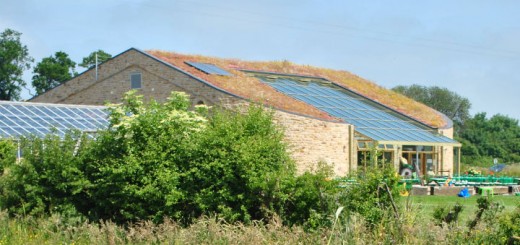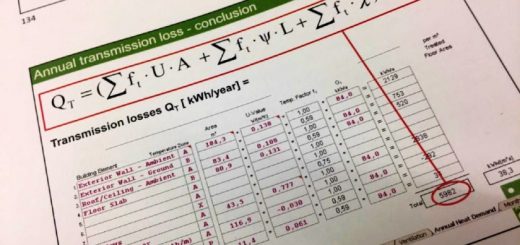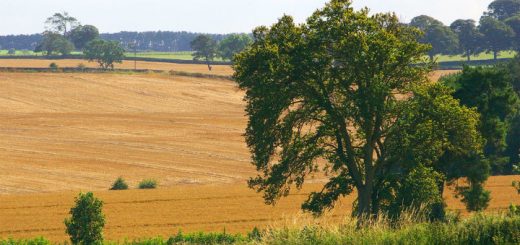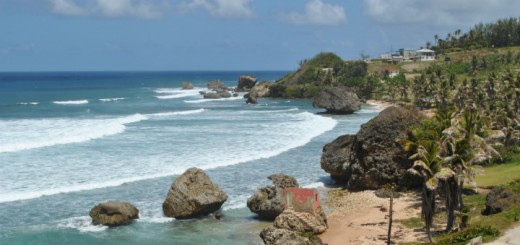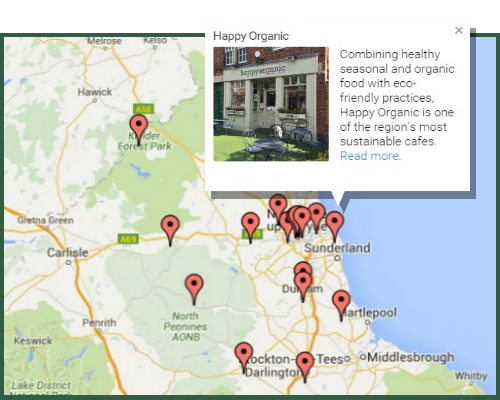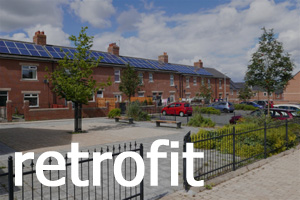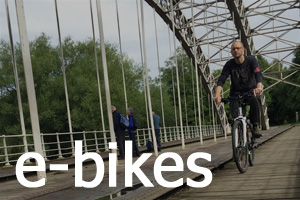A Breath of Fresh Air
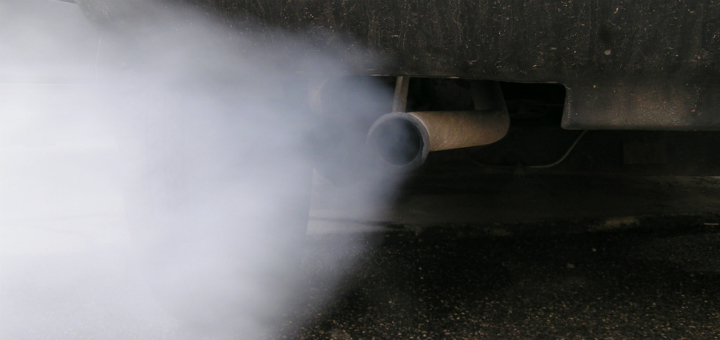
Plans put forward by three North East councils to rapidly reduce air pollution are a golden opportunity to forge a sustainable transport system.
Wednesday saw the start of a ten week consultation in Newcastle, Gateshead and North Tyneside on measures to improve air quality at traffic blackspots. The government has ordered these councils, amongst others, to clean up their act since an estimated 40,000 people die prematurely as a result of air pollution. Two years ago we published data on just how bad the air quality in Newcastle can be, with nitrogen dioxide levels at the Swan House roundabout, for example, dramatically exceeding legal limits.
The main cause of this air pollution is transport, particularly from older diesel vehicles. Therefore, the two options put forward focus on discouraging traffic from entering Newcastle city centre through charging mechanisms. The first proposal is a new Clean Air Zone. Similar to the congestion charge in London, any vehicle not meeting the minimum emissions standards would be charged a daily rate. The zone would likely be extensive to reduce the risk of drivers just rerouting through residential areas. Charges could be £12.50 per car unless they meet the Euro 4 standard for petrol engines or the Euro 6 standard for diesels.
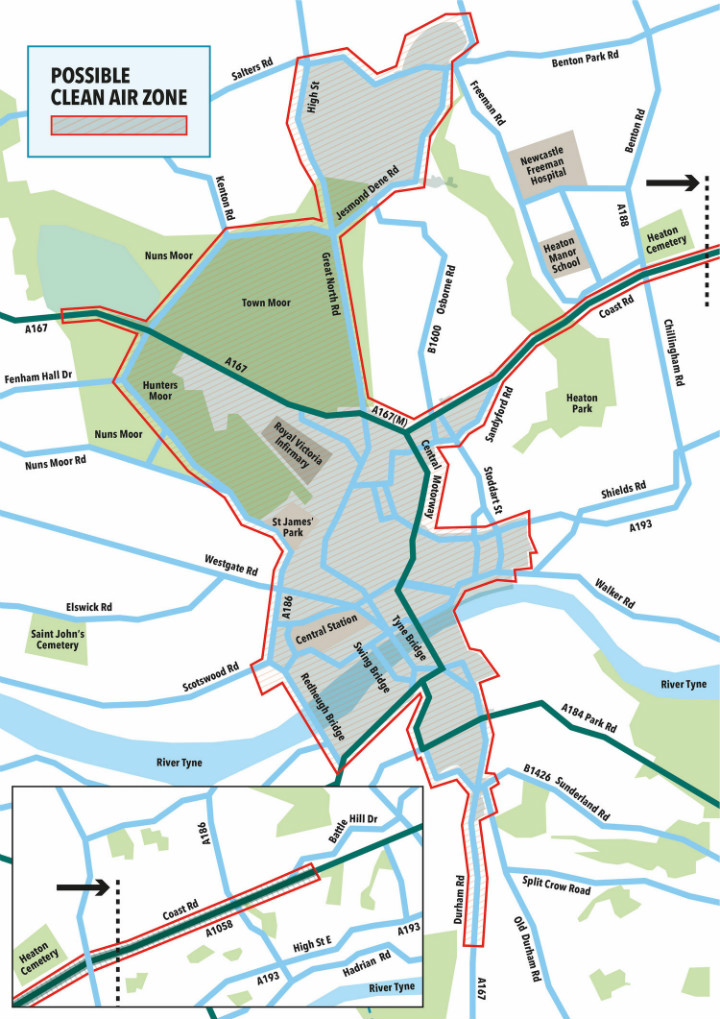
Map showing potential extent of charging Clean Air Zone
The second proposal is a smaller Low Emission Zone coupled with tolls on the three central Tyne crossings, the Tyne Bridge, the Swing Bridge and the Redheugh Bridge. The Low Emission Zone would essentially ban taxis, busses and lorries from entering the city centre unless they had the cleanest engines. All vehicles, including cars, would then pay the bridge tolls which could be similar to the Tyne Tunnel at £1.70 per crossing.
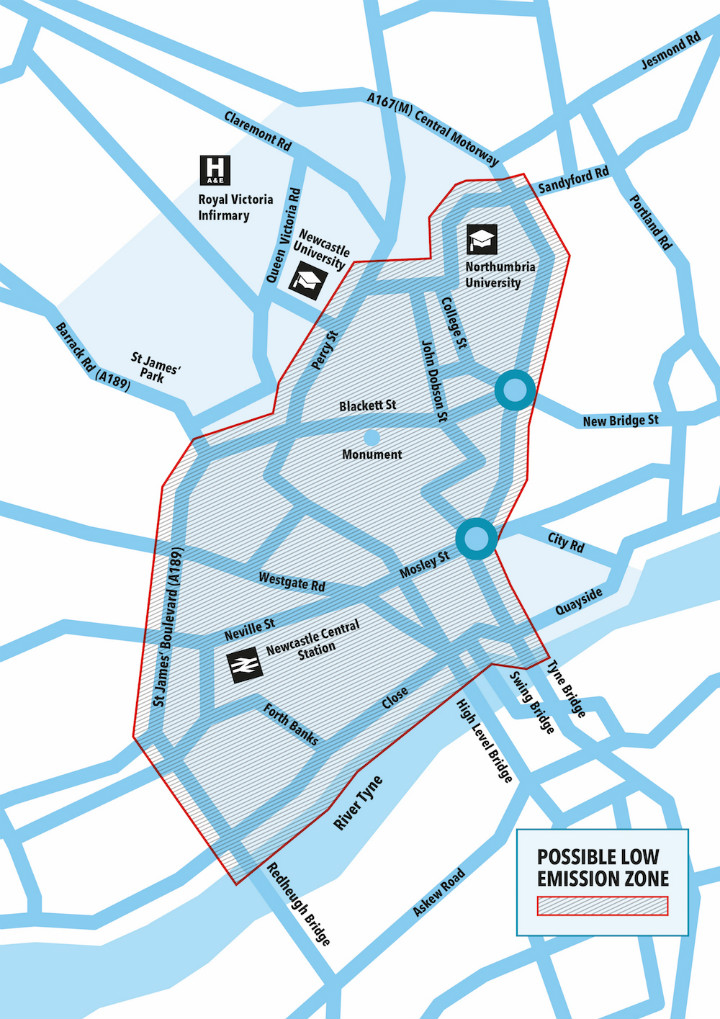
Map showing potential extent of Low Emission Zone
Whichever of the two options is chosen will depend on the consultation feedback from residents and businesses, and also on traffic modelling that the council has been undertaking. Obviously, the option which reduces air pollution as quickly as possible must surely be favourable. However, I’m encouraged by the longer term strategic thinking being put forward on the consultation website.
“It’s not enough to put in place short term measures, such as charging, on their own. We also need to encourage longer-term changes in how we travel to ensure we continue to see improved air quality.” (1)
Let’s be clear, there is no ‘safe’ level of air pollution, and therefore any attempt to design a system to just meet a certain target is flawed. A sustainable transport system doesn’t mean a switch to cleaner cars, but to electrified public transport, cycling and walking. Making serious changes to the way we travel has numerous benefits for the city centre environment, and on people’s health and wellbeing. It could also start to reduce the carbon emissions from transport which are stubbornly refusing to fall. (2)
The consultation website proposes that any surplus money received through charging, after the costs of running the scheme have been met, must be invested in transport improvements. Whilst a Clean Air Zone may raise money in the short term, until people replace their cars with newer cleaner models, my hunch is that a Low Emission Zone coupled with tolls on the Tyne crossings will continue to support investment into the future.
No doubt many drivers will be outraged and see this as yet another tax on motoring. In reality, the cost of driving has fallen significantly over the last 40 years, whilst public transport costs have skyrocketed (3). Our underfunded councils need cash to support public transport and to build better cycle highways and wider pavements, and I can support the introduction of tolls if the money is invested wisely. True, some less-affluent people may be unfairly penalised by the Clean Air Zone option if they can’t afford to upgrade to newer efficient vehicles. However, 40% of households across Tyne and Wear have no access to a car, and they will all benefit from improved sustainable transport infrastructure (4).
Reflecting on how cars have come to shape our lives and our cities, George Monbiot sums up why we need to grasp the opportunities to not only tackle air pollution but to forge a sustainable transport system:
“In this age of multiple emergencies – climate chaos, pollution, social alienation – we should remember that technologies exist to serve us, not to dominate us. It is time to drive the car out of our lives.” (5)
The consultation runs until 17th May to allow the councils to submit their final plans to government in July. Responses can be submitted through the consultation website here. For a more detailed examination of the proposals, I would refer you to this excellent blog post by Space for Gosforth.
References
- Consultation website, Breathe-cleanair.com
- “Transport emissions in the UK have declined by only 2% since 1990.” Cars are killing us. Within 10 years, we must phase them out. Guardian, 7 March 2019
- “Despite regular warnings by car lobbyists of a ‘war on the motorist’, between 1980 and 2014 the cost of motoring fell by 14 per cent – but in the same period, bus fares increased by 58 per cent.” Driving a car is getting cheaper and cheaper while trains and buses just keep getting more expensive. Independent, 3 July 2015
- “The North East has historically low levels of car ownership, with 36.8% of households in Tyne and Wear without access to a car or van, a figure which rises above 70% in some wards.” P.12, Air Quality Feasibility Study, Strategic Case, 2019, by the joint councils.
- (ibid)



